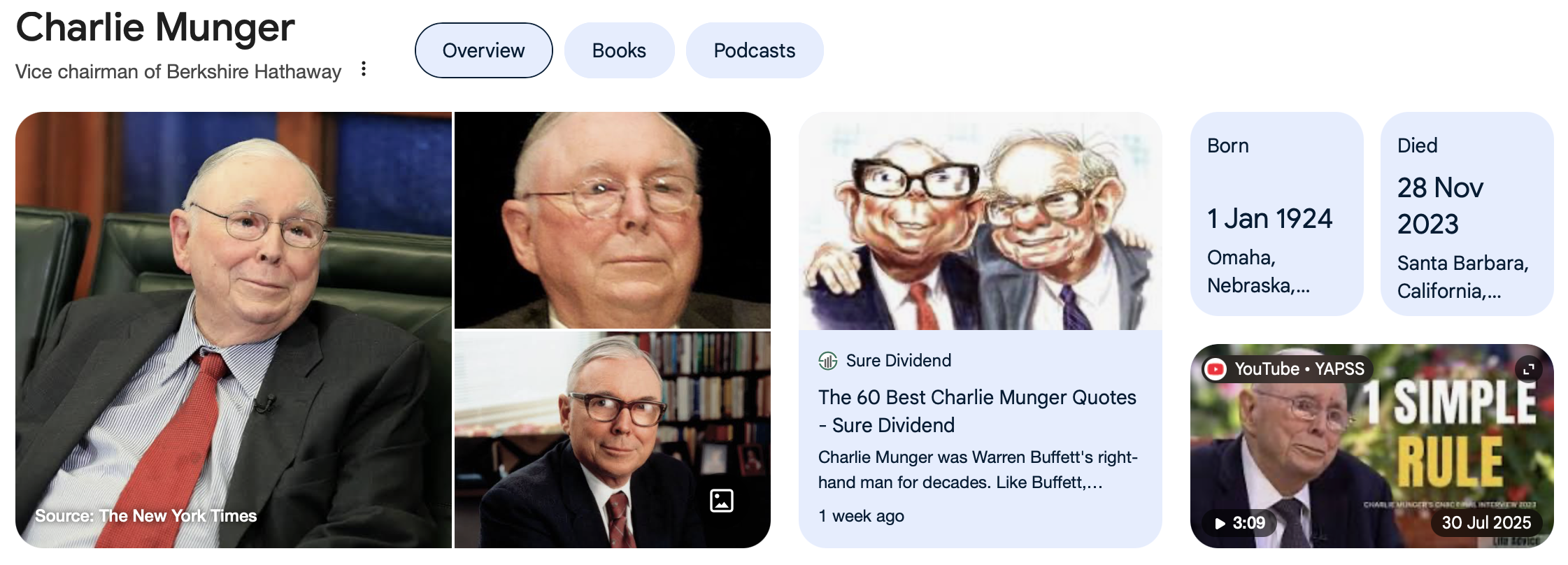Oct 2, 2025 • 6 min read
10 Timeless Life & Wealth Principles From Charlie Munger: The Playbook for Success
Lessons from Munger’s mental models — not just to grow wealth, but to think better, avoid stupidity, and build a life that compounds meaningfully.

- Core idea: Think in a latticework of models, avoid stupidity, and compound small improvements daily.
- Why it matters: These principles reduce big mistakes and build long-term edge across investing and life.
- Apply now: Write your legacy, build filters, study daily, and track decisions monthly.
Charlie Munger’s approach isn’t a list of clever quotes — it’s a system: avoid fatal errors, develop multidisciplinary mental models, and apply them consistently. The edge comes from fewer stupid mistakes, not from rare brilliant strokes.
1. Write Your Obituary — and Live It Backwards
Reverse-engineer your life: define the legacy and align daily actions to it. Execution: set legacy goals, audit daily habits, eliminate mismatches.
2. Seize the Rare Opportunities — Boldly
Munger called for concentrated bets when asymmetry is clear. Practice: spot high reward/low risk set-ups, concentrate with conviction, don’t over-diversify.
3. Be a Lifelong Learner — Across Disciplines
Build a latticework of mental models (psychology, economics, biology). Read widely and apply cross-disciplinary thinking to problems.
4. Stop Blaming Others — Own Your Outcomes
Adopt responsibility as a habit. Shift from “why me” to “what now”. Learn faster by treating failures as data.
5. Know What to Avoid — and Avoid It Relentlessly
Avoiding stupidity compounds faster than chasing brilliance. Make a “Don’t Do” list: poor partners, toxic debt, bad habits — and review it weekly.
6. End Every Day Smarter Than You Started
Daily incremental learning (30–60 minutes) compounds into transformational wisdom. Practice reading, note-taking, and teaching.
7. Understand Incentives — They Drive the World
Always ask “what’s their incentive?” Align incentives in partnerships and investments; misaligned incentives are a common source of failure.
8. Prepare for Tough Times — and Ask If You Can Handle Them
Stress-test your plans. Build emergency funds and resilience. Rehearse worst-case scenarios mentally and practically.
9. Do What You Love — And Do It With People You Respect
Work aligns with values when you love the task and respect the team. Audit your work relationships and prioritize long-term thinkers.
10. Win by Not Being Stupid — Consistently
Create systems (checklists, feedback loops) that minimize errors. Focus on process and patience rather than predictions.
| Context | Quick note |
|---|---|
| Compound learning | 30–60 mins daily → exponential improvement over years |
| Opportunity concentration | High-conviction, low-diversification approach often outperforms in rare windows |
- Write your 25-word legacy now. Put it on your phone wallpaper.
- Create a “Don’t Do” list. Review weekly and remove one bad habit this month.
- Stack 30 minutes daily learning. Use a simple reading tracker (log title + 1-sentence takeaway).
- Decision filter: before any major choice, ask: incentives? downside? avoidable stupidity?
These are life and career frameworks, not instant shortcuts. Overconcentration without due diligence can backfire. Preserve optionality while you build conviction.
Join the XpertNifty Community
Market updates, my analysis, research notes, short videos and lecture invites — posted first in the community.
Short, high-quality notes — not long newsletters. Join if you want fast, actionable insights.
- Write your legacy: define success in 25 words today.
- Create decision filters: Incentives? Risk? Alignment?
- Study daily: commit to 30–60 minutes and log key takeaways.
- Track decisions monthly and refine models.
- Play the long game: focus on decades, not days.
The biggest advantage in life is not being brilliant — it’s not being stupid repeatedly. Compound small, smart choices daily.
Stay Ahead — Join XpertNifty
Market updates, my live trade cues, research notes, new videos and lecture invites — get them first in the community.
(No spam — just concise, tradeable insights and short research videos.)
- Daily learning compounds — commit to small, consistent actions.
- Avoiding stupid mistakes often beats chasing brilliance.
Further reading:
- Charlie Munger — Biography & ideas
- Mental models overview (Farnam Street)
- Books: Poor Charlie’s Almanack, The Intelligent Investor, Principles
